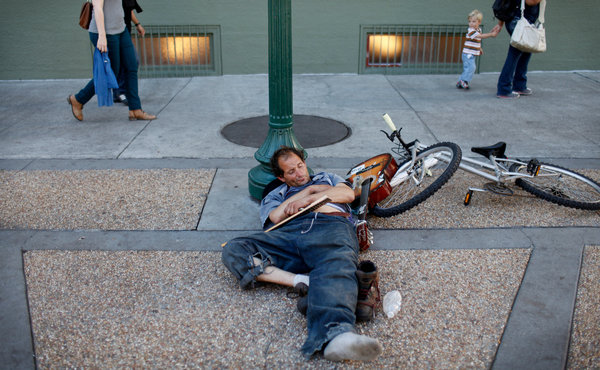On any given night there are more than 600,000 homeless citizens of the United States who do not have indoor shelter. Most live in urban communities and are consigned to finding places to sleep wherever they can, beneath bridges or in parks, alleyways, and culverts, sometimes in tents and sometimes not, sometimes in cars and sometimes simply on public streets and walkways. Their presence is often perceived by those not so unfortunate as a public nuisance and so, not surprisingly, there has been something of an explosion of laws nationwide that criminalize all manner of behaviors which penalize people for being homeless.
The assumption, it seems, is that we can address the “problem” of homelessness by making it more or less invisible in public spaces, and if we can’t do that then we will at least label it as deviant by making it illegal. It is not entirely clear how effective such a strategy might actually be, since such laws are typically not accompanied with sufficient alternatives to “house” or otherwise accommodate such individuals. But there is a larger problem, for it assumes that homelessness is a moral aberration that somehow mitigates one’s rights as a citizen to occupy and utilize public spaces. The issue is not whether the homeless are “deserving” or not of their condition, nor for that matter whether their very presence undermines economic commerce in certain areas or neighborhoods, but whether a liberal-democratic society can function effectively by refusing civic (or human) rights to citizens on the basis of their socio-economic status.
Put differently, it seems likely that the condition of homelessness is not about to go away anytime soon—indeed, as some have argued it is endemic to the social, political, and economic worlds in which we live—and its not clear how the polity is served by treating the homeless as a group whose civil rights are nugatory. The man sleeping on a public street in Berkeley, CA in the photograph above has been homeless for ten years and it is not likely that his condition will change anytime soon. Declaring him a criminal and denying him access to the public parks and streets does nothing to address either the “problem” of homelessness or to promoting a democratic culture predicated on egalitarian principles. At their best, such laws simply cast the homeless as scapegoats for a situation with which we are otherwise uncomfortable, and thus making it less visible to the public gaze. But even at that, we have to recognize that, as in the photograph above, there will always be those like the young child who stare cannot be fully controlled. How much better might it be to imagine the homeless as citizens and to accord them the basic right to be in public spaces?
Credit: Ramin Rahimian/NYT

Curb Appeal:
http://www.efn.org/~hkrieger/w3333b.jpg
Ken with Rothschild:
http://www.efn.org/~hkrieger/w3577.jpg
Diana and Mike:
http://www.efn.org/~hkrieger/w3699.jpg
He is a free man,why should he move somewhere else? Because it is a disgrase? He looks friendly and relaxed. I think people should not feel better then him. Who is good and who is bad is not for us to decide…..
Great article. “… and thus …” is redundant (just trying to help)